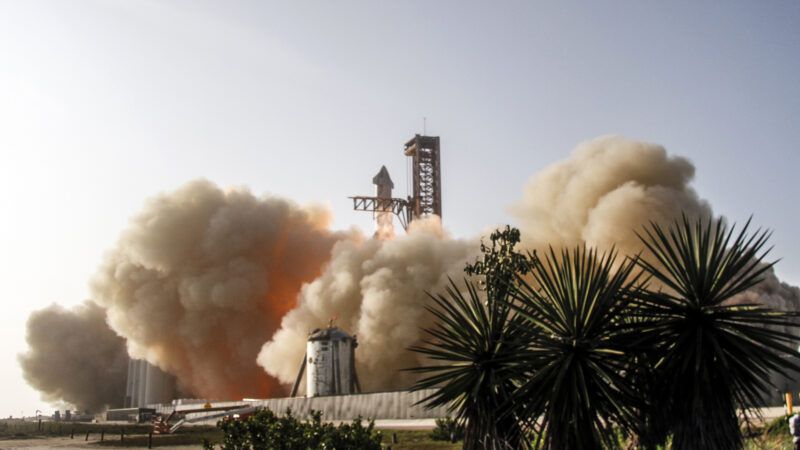Environmentalist Lawsuit Could Delay SpaceX's Starship Launches for Years
The FAA required SpaceX take 75 separate actions to mitigate the environmental impacts of launches from its Boca Chica, Texas, launch site. A new lawsuit says it's not enough.

In the wake of another SpaceX rocket explosion, a coalition of environmental groups and nonprofits have filed a lawsuit against the Federal Aviation Administration (FAA) claiming that the agency failed to perform adequate environmental analysis of private space company SpaceX's operations at its Boca Chica, Texas, launch site.
They're demanding that the existing environmental approvals be thrown out and redone, potentially delaying future SpaceX launches for years.
"Federal officials should defend vulnerable wildlife and frontline communities, not give a pass to corporate interests that want to use treasured coastal landscapes as a dumping ground for space waste," said Jared Margolis, a senior attorney at the Center for Biological Diversity, one the plaintiffs, in a press release.
The first test launch of the company's Starship vehicle last month saw it make it off the pad only to explode over the Gulf of Mexico. SpaceX CEO Elon Musk says the launch was a qualified success that provided the company with useful data and that they should be ready to launch again within a few weeks, reports CNBC.
The FAA has grounded SpaceX Starship rockets while it conducts a "mishap" investigation, reports Reuters.
The Center for Biodiversity and their co-plaintiffs are demanding significantly more federal scrutiny.
The lawsuit filed by the Center for Biodiversity, the American Bird Conservancy, the Surfrider Foundation, Save RVG, and the Carrizo/Comecrudo Nation of Texas in the U.S. District Court for the District of Columbia claims that the FAA failed to follow the requirements of the National Environmental Policy Act (NEPA) before signing off on SpaceX's Starship/Super Heavy launch project in June last year.
NEPA requires that federal agencies study the environmental impacts of the projects they take on, whether that's the decision to fund the widening of a highway or signing off on a new space launch facility.
In June 2022, the FAA released a 40-page environmental assessment of SpaceX's launch program that found no evidence it would have significant impacts provided it adopted 75 mitigation actions.
Ars Technica described a couple of those mitigation actions in an article from last year. SpaceX would have to shield its artificial lights to prevent interference with turtles nesting on nearby beaches, prevent falcons from nesting on site, and hire a biologist to monitor impacts to flora and fauna from its launches and other activities.
To placate humans who might want to vacation in the area, SpaceX also agreed to not launch rockets on various federal and Texas holiday weekends. SpaceX launches require the closure of access roads to public beaches in the area.
There were also more unusual demands made of SpaceX, including that it make annual $5,000 payments to an "adopt-an-ocelot" fund and pay for the installation of placards in the area detailing the local history of the Mexican-American and Civil Wars.
In addition to these mitigation measures, SpaceX also significantly scaled back the planned facilities at its Boca Chica site, reports Ars Technica. It ditched proposals for an on-site fuel manufacturing facility, a desalination plant, and a power plant.
SpaceX's hope was that the reduced footprint of the site would enable the company to avoid a full-blown Environmental Impact Statement (EIS). That's the most severe form of NEPA review. The documents themselves often run hundreds of pages. They take 4.5 years to complete, on average, and run over 600 pages. Some statements for large and complex projects like highways or power transmission lines can take over a decade.
Plaintiffs argue in their lawsuit that the SpaceX Starship launch program is the exact kind of program that requires an EIS, given the launch site's agency to several state parks and wildlife areas and the size of the rockets being fired.
"Permitting SpaceX to launch the largest rockets known to humankind is a type of significant federal action that requires full analysis in an EIS," reads the lawsuit.
The NEPA suit raises a number of impacts that it claims were not sufficiently studied or mitigated in last year's assessment. While SpaceX is limiting its launches on and around particular holidays to reduce necessary road closures, plaintiffs argue that the 500 hours of road closures that the company is still allowed need to be analyzed further.
While SpaceX analyzed the effects of its own greenhouse gas emissions, it failed to address the cumulative harms of rising greenhouse gas emissions for the entire planet as required by NEPA, the lawsuit argues.
The June 2022 environmental assessment required SpaceX to consult with biologists about wildlife impacts after a launch "anomaly" and/or explosion. Plaintiffs are demanding that mitigations to prevent explosions in the first place should be adopted.
That seemingly misses the point of the launches. SpaceX is testing rockets to gather data so that the risk of future explosions can be reduced.
If mitigation measures existed to prevent these problems today, surely the company would have adopted them. SpaceX having to wait years to start launches again while an EIS is created means the company will lose years of data from additional test flights.
It's one example of how environmental review laws, and lawsuits citing them, can impinge on a goal that environmentalists and SpaceX are both seemingly in favor of: fewer SpaceX rockets exploding.
Rent Free is a weekly newsletter from Christian Britschgi on urbanism and the fight for less regulation, more housing, more property rights, and more freedom in America's cities.


Show Comments (42)